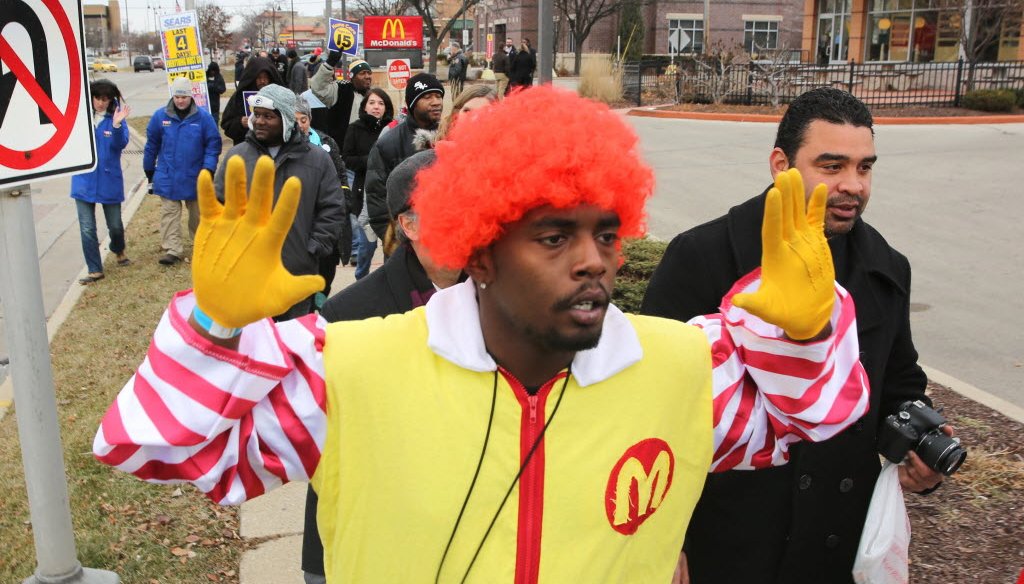



Fast food workers and supporters, including a man dressed as Ronald McDonald, rallied for a higher minimum wage in the Milwaukee suburb of Glendale on Dec. 4, 2014. (Mike De Sisti photo)
During a campaign speech in Milwaukee, former U.S. Sen. Russ Feingold called for gradually raising the federal minimum wage to $15. It is now set at $7.25 an hour.
And without mentioning Republican U.S. Sen. Ron Johnson by name, the Democrat attacked Johnson. The two are poised for a rematch in 2016.
"Now, my likely opponent, the incumbent senator, opposes entirely -- get this, opposes entirely -- a federal minimum wage," Feingold said Aug. 18, 2015. "At least for Americans -- apparently he has some openness about guest workers -- disrespecting the hard work and dignity of too many working Wisconsinites."
Johnson has often spoken against raising the minimum wage.
But does he oppose there being any general federal minimum wage law?
Hot topic -- $10, $12 or $15
Raising the federal minimum wage is a common campaign plank among Democrats. A month before Feingold’s speech, U.S. Sen. Bernie Sanders, an independent from Vermont who is seeking the Democratic nomination for president, introduced legislation for an increase to $15 an hour. Meanwhile, Democratic presidential contender Martin O’Malley also backs $15, while front runner Hillary Clinton, like President Barack Obama, has expressed support for $12.
Many Republicans -- including Johnson and one of the leading GOP candidates for president, Wisconsin Gov. Scott Walker -- oppose a raise. Walker argued in 2014 that minimum-wage jobs are overwhelmingly for young people starting out in the work force, a statement we rated False. We found the best estimates were that 24 percent to 55 percent of such jobs are held by teenagers and young adults.
But later in the year, PolitiFact National rated Mostly True a claim by U.S. Senate Majority Leader Mitch McConnell, R-Ky., that raising the minimum wage to $10.10 would "destroy" between 500,000 and 1 million jobs. The nonpartisan Congressional Budget Office had said that "roughly" 500,000 workers could lose their jobs, but that most likely the range was between very few to 1 million.
What Johnson said
To back Feingold’s claim, his campaign cited comments Johnson made more than a year earlier, at a July 2, 2014 WisPolitics luncheon in Milwaukee.
A member of the audience asked Johnson: "What should the federal minimum wage be? Or should there not be a minimum wage?"
Johnson replied:
"Shouldn’t be one. The only area that I would agree with minimum wage is in immigration reform, the guest worker program. I'd be 100 percent supportive of a minimum wage -- kind of industry specific, maybe regionally specific -- for guest workers, so that we're not creating incentives for employers to bring in immigrants to lower the price of labor."
He added:
"In the general economy, you get government involved in making market decisions -- first of all, they're going to get it wrong. For a minimum wage, you will actually reduce the number of jobs available. What you don't want to do -- if you're concerned about poverty, if you're concerned about providing opportunity -- you don't want to rip the bottom rung of the ladder of opportunity away from people. And that’s what you do."
(The federal government has so-called guest worker programs that allow foreign nationals to fill temporary jobs, both agricultural and non-agricultural.)
Johnson did not dispute Feingold’s claim. His campaign emailed us a statement that said in part that Johnson worked for minimum wage on his first job and "knows minimum wage laws are here to stay and we should design them to make sure they don’t hurt the very people they are designed to help." Johnson opposes a raise to $15, the statement added, but "does not seek to get rid of the federal minimum wage -- it's here to stay."
Our rating
Feingold says Johnson "opposes entirely a federal minimum wage," except perhaps for "guest workers."
It may not be a position Johnson has stated often, but when asked in July 2014 whether there should be a federal minimum wage, Johnson said there should not be one, other than perhaps one for guest workers.
And while he may not be trying to repeal the wage, Johnson didn’t dispute the accuracy of Feingold’s claim -- that he is against having a federal minimum, except perhaps for guest workers coming in from outside the United States.
We rate Feingold’s statement True.
Russ Feingold speech in Milwaukee, Aug. 8, 2015
Email exchange, Russ Feingold campaign spokesman Max Croes, Aug. 18, 2015
WisPolitics, "Johnson opposes minimum wage -- except for guest workers," July 2, 2014
WisPolitics, audio of U.S. Sen. Ron Johnson remarks (quote at 1:03:30), July 2, 2014
Email interview, U.S. Sen. Ron Johnson campaign communications director Brian Reisinger, Aug. 19, 2015
In a world of wild talk and fake news, help us stand up for the facts.
